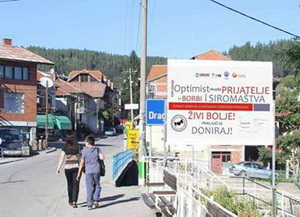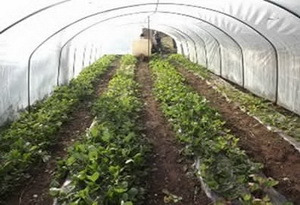 In order to encourage their fellow citizens to assume an active role in the development of the local community, organisation “Optimist” from Bosilegrad decided to help their neighbours in a difficult financial situation, by providing them with land and greenhouses, as well as enabling them to handle the production and sale of strawberries.
In order to encourage their fellow citizens to assume an active role in the development of the local community, organisation “Optimist” from Bosilegrad decided to help their neighbours in a difficult financial situation, by providing them with land and greenhouses, as well as enabling them to handle the production and sale of strawberries.
The Bosilegrad municipality is located in the southern parts of Serbia and in the last decades has been mainly characterised by depopulation, unemployment, poverty and insufficient economic growth. More than half of the agricultural land in Bosilegrad is not being cultivated, and half of the working age population is unemployed and belongs to socially vulnerable categories.
The “Optimist” organisation, a civil society organisation from Bosilegrad, is focused on raising awareness about how important it is for citizens to assume an active role in the development of their local community, so they have decided to help their neighbours in a difficult financial situation, by providing them with land and greenhouses, as well as enabling them to handle the production and sale of strawberries.
This project, made possible by the “Trag” Foundation “Social enterprise” programme, within the U.S. Agency for International Development (USAID) “Civil society for the future” project, implemented by the Institute for Sustainable Communities (ISC), has provided a steady income for ten families in Bosilegrad.
What did they do first?
They gathered the inhabitants and landowners, so they could discuss the availability of land that was not being cultivated. With the support of the PC Directorate for Construction land and Roads Bosilegrad, contracts were signed which enabled citizens to utilize 10 parcels for a period of two years.
At the same time, “Optimist” collaborated with the Centre for Social Welfare in order to develop criteria for potential users;these criteria would take in consideration the size of the household, the number of working-age household members, number of children, owned real estate, average income and previous agricultural experience.
Special attention was paid to the Roma ethnic minority. After the criteria had been defined, a public call for applications was published.
After the selection had been done, ten beneficiary families with a total of 50 members were selected, six of which were Roma families. The land was ploughed, greenhouses placed and irrigation systems constructed.
 “Optimist” has collaborated with several institutions of local authorities, which have generously supported this phase of the project: Directorate for Construction land and Roads has donated the equipment, the Department of Agriculture from Vranje has held two workshops in order to teach users what is necessary for an effective greenhouse production of strawberries, while the Institute of Agriculture has tested the land inside the greenhouses.
“Optimist” has collaborated with several institutions of local authorities, which have generously supported this phase of the project: Directorate for Construction land and Roads has donated the equipment, the Department of Agriculture from Vranje has held two workshops in order to teach users what is necessary for an effective greenhouse production of strawberries, while the Institute of Agriculture has tested the land inside the greenhouses.
Moreover, “Optimist” organisation succeeded in collecting more than 8.000 dollars from the local population and businesses.
After a more detailed preparation phase and careful growing, the families managed to have four successful strawberry harvests; four families even built one more greenhouse from what they have earned from the sale. By selling strawberries, the families earned on average more than 500 euros in 2012.
This “Optimist” project contributed immensely to the Municipality of Bosilegrad. The local government is in the process of creating a Council for fighting poverty. Furthermore, as a result of the hard work and enthusiasm of the “Optimist” members, desire for knowledge and learning new skills of the users, generous help received from local institutions, “Trag” Foundation, ISC and USAID, ten families from Bosilegrad were economically empowered with tools, skills and resources that they received. This project has really proved to be a glimmer of hope in these difficult times in Serbia.
(Taken from the www.iscserbia.org website with the kind permission of the Institute for Sustainable Communities (ISC))
 Government of the Republic of Serbia
Government of the Republic of Serbia















 pdf [271 KB]
pdf [271 KB]
Leave a Comment